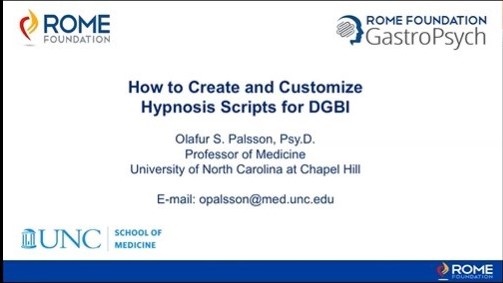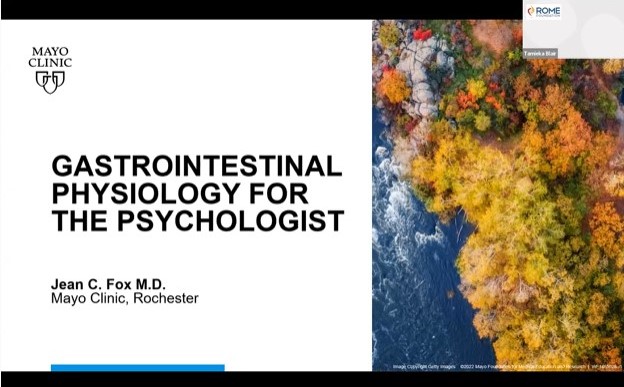 Rome Campus
Rome Campus
Behavioral Interventions for DGBI Conditions of the Upper GI Tract
Cognitive-Behavioral Therapy for Avoidant/Restrictive Food Intake Disorder (ARFID) - 2 CE Credits
Hypnosis Techniques in Psychogastroenterology - 3 CE Credits
GI Physiology for the Behavioral Health Provider - 1.5 CE Credits
Grand Rounds: The 3 step approach to Integrated Psychosocial Care in DGB
Grand Rounds: Abdominal Bloating and Distension
Grand Rounds: Abuse, Trauma, and Illness: What is the link?
Grand Rounds: Communication Skills
Grand Rounds: Sociocultural aspects of the assessment and treatment of patients with DGBI
Grand Rounds: ACG vs AGA IBS Guidelines and Clinical Application
Grand Rounds: Post Covid-19 DGBI
Grand Rounds: Deep Dive Into Central Neuromodulators
Grand Rounds: DGBI in Pediatric Populations
Grand Rounds: Gastroparesis vs FD
Grand Rounds: History of Disorders of Gut-Brain Interaction - DGBI (Functional GI Disorders)
Grand Rounds: DGBI Overlapping with Organic Disease
Rome Foundation Virtual Pediatric Symposium - 0 CE Credits
2023 Pediatric Symposium: Hot Topics in Pediatric DGBI
POC: The 3 step approach to Integrated Psychosocial Care in DGB
Grand Rounds: The 3 step approach to Integrated Psychosocial Care in DGB
Grand Rounds: Abdominal Bloating and Distension
Grand Rounds: Abuse, Trauma, and Illness: What is the link?
Grand Rounds: Communication Skills
Grand Rounds: Sociocultural aspects of the assessment and treatment of patients with DGBI
Grand Rounds: ACG vs AGA IBS Guidelines and Clinical Application
Grand Rounds: Post Covid-19 DGBI
Grand Rounds: Deep Dive Into Central Neuromodulators
Grand Rounds: DGBI in Pediatric Populations
Grand Rounds: Gastroparesis vs FD
Grand Rounds: History of Disorders of Gut-Brain Interaction - DGBI (Functional GI Disorders)
GastroPsych

Behavioral Interventions for DGBI Conditions of the Upper GI Tract
A Rome Foundation Continuing Medical Education program
Psychological and behavioral factors play a key role in developing and maintaining DGBI conditions, including disorders of the upper GI tract. Several complex upper GI disorders can be effectively treated with behavioral interventions delivered by multidisciplinary care team members, including psychologists and speech-language pathologists. In a practical and engaging lecture series, leading experts in psychogastroenterology will discuss the anatomy and physiology of the upper GI tract and behavioral techniques to treat belching disorders, rumination syndrome, and gastroesophageal reflux. Each seminar will include a didactic presentation, an overview of the condition being treated, the rationale for behavioral intervention, and the scientific basis for the approach. The program will draw upon current research findings as well as the presenters’ clinical expertise.

Cognitive-Behavioral Therapy for Avoidant/Restrictive Food Intake Disorder (ARFID) - 2 CE Credits
Individuals with chronic gastrointestinal (GI) conditions are at higher risk for developing Avoidant/Restrictive Food Intake Disorder (ARFID)– particularly individuals with DGBIs and dietary-treated conditions. Co-occurring ARFID can have significant health and psychosocial consequences and impact GI condition management. This in-depth workshop will provide Gastropsych clinicians with up-to-date education on ARFID prevalence in GI conditions, diagnostic criteria, and evidence-based treatment strategies, with a particular focus on the use of cognitive-behavioral therapy for ARFID. This program will benefit the multidisciplinary team of GI clinicians that care for individuals with chronic GI conditions (e.g., dietitians, advance practice providers, gastroenterologists) in addition to GI mental health clinicians.

Hypnosis Techniques in Psychogastroenterology - 3 CE Credits
Learn about the emerging field of psychogastroenterology and how brain-gut psychotherapies, such as gut-directed hypnotherapy can improve outcomes and quality of life for many patients with chronic GI disorders.

GI Physiology for the Behavioral Health Provider - 1.5 CE Credits
By the end of this session, participants will be able to:
● Describe and be able to explain to patients the path of digestion from the mouth to the anus, including the role of the esophagus, stomach, intestines, as well as the role of the liver, pancreas and gall bladder.
● Identify a minimum of 3 common digestive disorders and their etiology.
● Effectively explain the dynamics of defecation to patients, and the potential impact of trauma.
● List lifestyle factors and behaviors that can contribute to digestive disruption.

An introduction to Acceptance and Commitment Therapy for Disorders of Gut-Brain Interaction (DGBI) - 7 CE Credits
Acceptance and Commitment Therapy (ACT) is an emerging transdiagnostic psychotherapeutic approach for the treatment of long-term chronic conditions, including Disorders of Gut-Brain Interaction (DGBI), such as Irritable Bowel Syndrome or Inflammatory Bowel Diseases. Using an experiential approach, this session intends to introduce practitioners to the ACT model of case conceptualization in DGBIs. Further to that, a brief description of the model of intervention will also be provided, alongside some brief ACT consistent practices that can be easily incorporated into current patient management.
